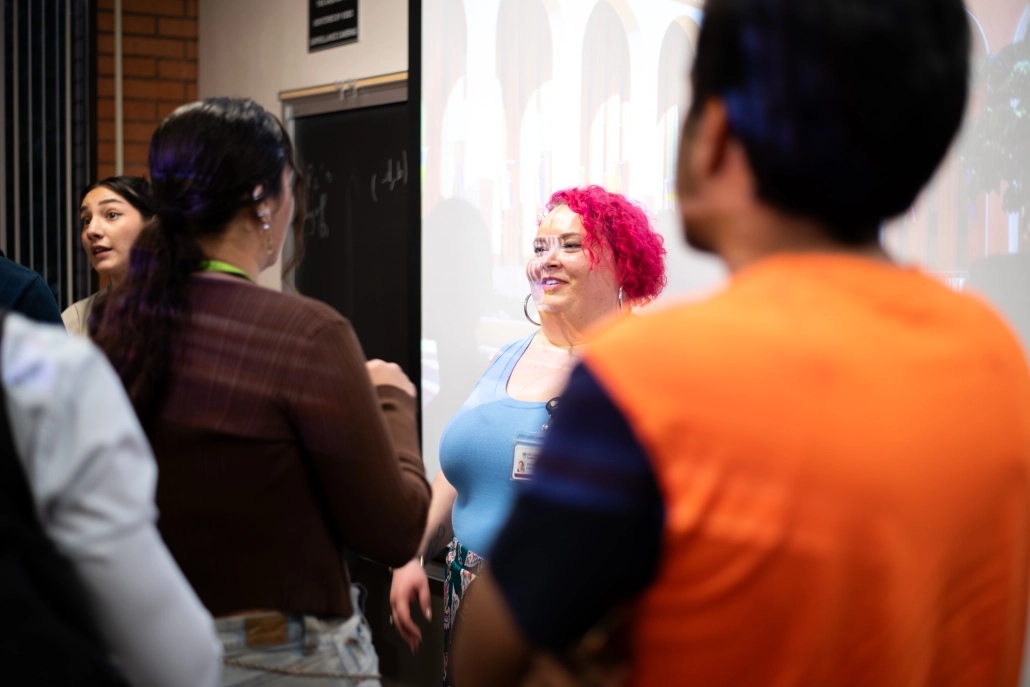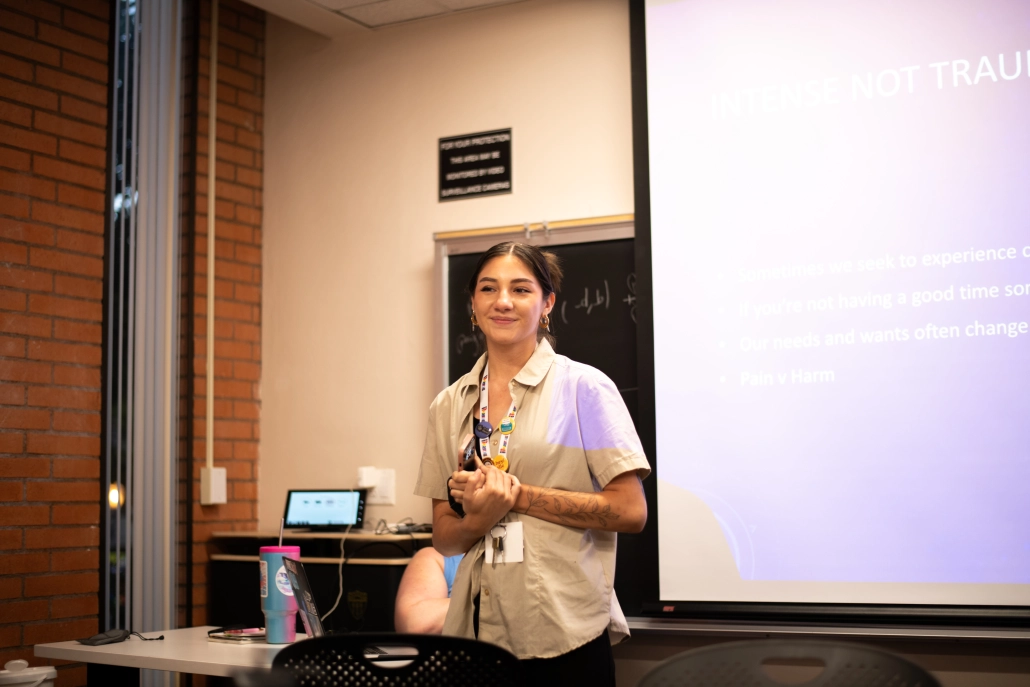No blurred lines: ‘Sexpert’ teaches consent
Attendees learned about consent and agency’s applications to kinks.
Attendees learned about consent and agency’s applications to kinks.

There is an important distinction between bondage, discipline, sadism and masochism, commonly referred to as BDSM, and abuse, said Guru Shabd Khalsa during an event called “Yes Please! Pleasure, Power Exchange, and Consensual Kink” Wednesday afternoon.
The Student Assembly for Gender Empowerment, Relationship and Sexual Violence Prevention and Services, and Student Health came together to host the event to educate students on the power of consensual sexual relationships.
Khalsa, a licensed family and marriage therapist and a clinician at the University’s Counseling Services & Crisis Intervention, was the main speaker at the event. She framed the conversation as an opportunity to discuss non-traditional ideas around sex, sexuality and relationships in a healthy and productive way.
“I feel super strongly that healthy, safe, consensual sex is a right and a healthy part of every human being’s life,” Khalsa said. “[I] feel really strongly about you being able to access that without a lot of shame and fear and danger.”
Khalsa began by talking about hookup culture, emphasizing the widespread pressure to engage in casual, sexual relationships. She described hookup culture as lacking meaningful intention and communication. Khalsa encouraged the audience to ignore pressures about what sex should look like and establish their own boundaries of how sex is meaningful to them.
“If you are having negative reactions to stuff that a lot of your peers are doing, it’s okay to sit with that to recognize it and recognize that what works for other people might not work for you and that does not mean that anything is wrong,” Khalsa said.
Khalsa established that the two most important aspects of any sexual relationship are consent — a freely given, reversible, enthusiastic, informed and specific agreement on the actions taking place — and agency, the ability to control an action and its consequences. She challenged the stigma that asking for consent is “unsexy” and ruins the moment by emphasizing that consent makes both parties feel empowered, and there are sexy ways to check in and ensure what happens is consensual.
Mithun Tiruvedula, a graduate studying computer engineering who attended the event, said discussing these topics is important for the college student demographic, especially when coming from a background that sweeps these conversations under the rug.
“I’m from India, and [talking about sex] is a lot more taboo in India than here … And that does lead to a lot of problems later on,” Tiruvedula said. “So what I’ve seen in my relationships is there is no communication when it comes to talking about what I want, what I’m asking for, and that leads to a bridge that needs to be crossed and it’s a lot of effort.”

But sex education isn’t just important for people coming from different cultures; Molly Holsinger, a junior majoring in sociology and political science and the director of SAGE’s Body Love Month initiative, explained that events like these can be for anyone. That being said, she emphasizes that sex week’s focus on queer sex ed is what makes it especially pertinent.
“I do think that it’s really awesome and important that sex week does focus on queer sex ed because I think that’s something that a lot of people don’t get when they’re growing up,” Holsinger said, “and an opportunity for people to ask questions they might not feel comfortable asking another at other times or parts of their life.”
In the second half of her talk, Khalsa applied these ideas about consent and agency to kink and non-traditional relationships. She discussed that these types of interactions often make boundaries more explicit than conventional or mainstream sex, which can be extremely helpful for individuals with histories of trauma, neurodivergent individuals or others who struggle with sexual vulnerability.
She also said certain kinks like consensual nonconsent, where a partner deliberately says no when they mean yes, can require an extra layer of conversation to ensure all parties are very clear on their boundaries.
Khalsa ended the talk by explaining the importance of aftercare as an opportunity to check in and reestablish boundaries within relationships. She said repetitive meaningful relationships offer much more of an opportunity to learn and grow than one time hook-ups.
“The experience of being vulnerable, the experience of being really expressive [and] overt, will probably activate some stuff in you, and that’s good, that’s fine, but it is really hard to navigate that all by yourself if you can’t then check in with your partner,” Khalsa said.
Tiruvedula emphasized that college students curious about these topics shouldn’t have to feel alone. Despite what they may think, plenty of students are also curious and open to learning more.
“Forums like these give an opportunity for you to meet other people that have similar thoughts, and you don’t feel alone anymore,” Tiruvedula said. “I feel like that is something that we need to encourage.”
We are the only independent newspaper here at USC, run at every level by students. That means we aren’t tied down by any other interests but those of readers like you: the students, faculty, staff and South Central residents that together make up the USC community.
Independence is a double-edged sword: We have a unique lens into the University’s actions and policies, and can hold powerful figures accountable when others cannot. But that also means our budget is severely limited. We’re already spread thin as we compensate the writers, photographers, artists, designers and editors whose incredible work you see in our daily paper; as we work to revamp and expand our digital presence, we now have additional staff making podcasts, videos, webpages, our first ever magazine and social media content, who are at risk of being unable to receive the compensation they deserve.
We are therefore indebted to readers like you, who, by supporting us, help keep our paper daily (we are the only remaining college paper on the West Coast that prints every single weekday), independent, free and widely accessible.
Please consider supporting us. Even $1 goes a long way in supporting our work; if you are able, you can also support us with monthly, or even annual, donations. Thank you.
This site uses cookies. By continuing to browse the site, you are agreeing to our use of cookies.
Accept settingsDo Not AcceptWe may request cookies to be set on your device. We use cookies to let us know when you visit our websites, how you interact with us, to enrich your user experience, and to customize your relationship with our website.
Click on the different category headings to find out more. You can also change some of your preferences. Note that blocking some types of cookies may impact your experience on our websites and the services we are able to offer.
These cookies are strictly necessary to provide you with services available through our website and to use some of its features.
Because these cookies are strictly necessary to deliver the website, refusing them will have impact how our site functions. You always can block or delete cookies by changing your browser settings and force blocking all cookies on this website. But this will always prompt you to accept/refuse cookies when revisiting our site.
We fully respect if you want to refuse cookies but to avoid asking you again and again kindly allow us to store a cookie for that. You are free to opt out any time or opt in for other cookies to get a better experience. If you refuse cookies we will remove all set cookies in our domain.
We provide you with a list of stored cookies on your computer in our domain so you can check what we stored. Due to security reasons we are not able to show or modify cookies from other domains. You can check these in your browser security settings.
These cookies collect information that is used either in aggregate form to help us understand how our website is being used or how effective our marketing campaigns are, or to help us customize our website and application for you in order to enhance your experience.
If you do not want that we track your visit to our site you can disable tracking in your browser here:
We also use different external services like Google Webfonts, Google Maps, and external Video providers. Since these providers may collect personal data like your IP address we allow you to block them here. Please be aware that this might heavily reduce the functionality and appearance of our site. Changes will take effect once you reload the page.
Google Webfont Settings:
Google Map Settings:
Google reCaptcha Settings:
Vimeo and Youtube video embeds:
The following cookies are also needed - You can choose if you want to allow them:
